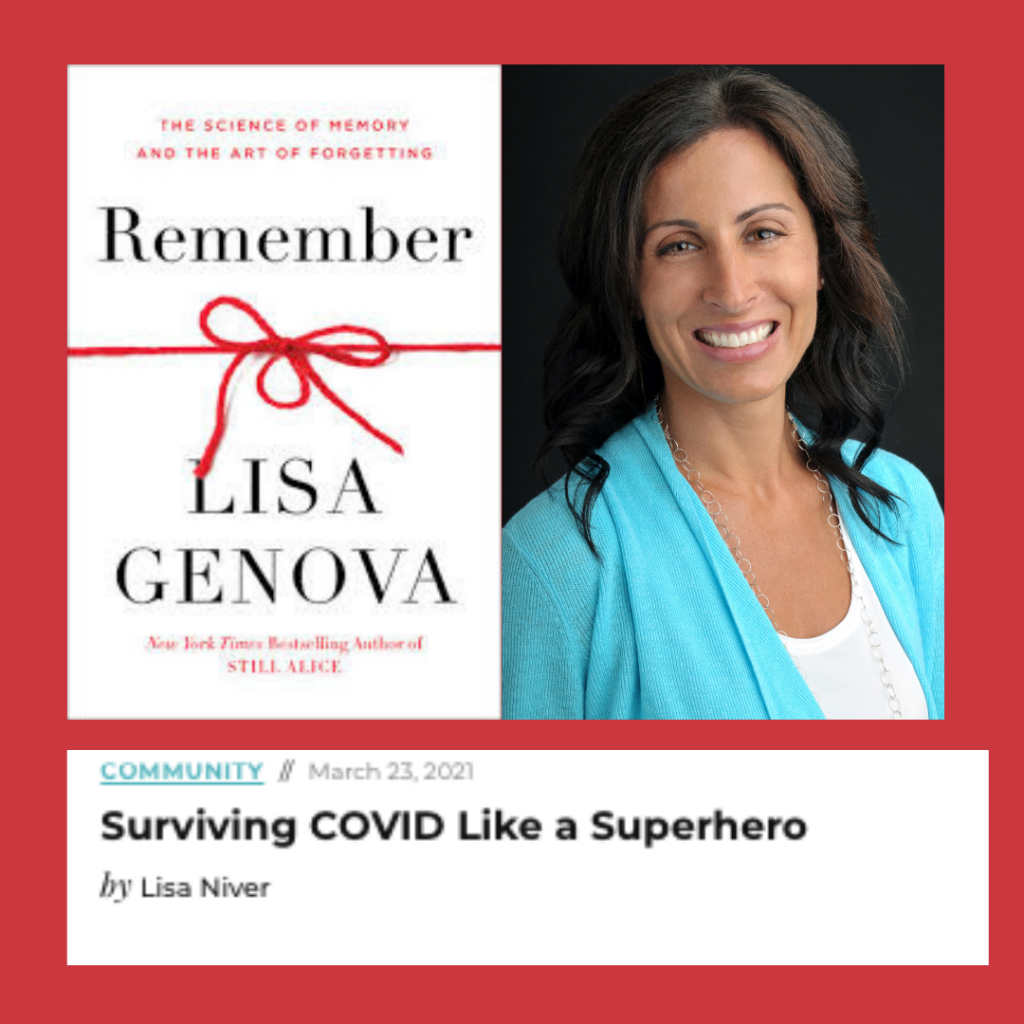Thank you to Thrive Global for publishing my article, “Surviving COVID Like a Superhero.”

Lisa Genova is not only a neuroscientist but also a gifted storyteller and has explained the experience of many debilitating diseases through her books from Alzheimer’s disease in Still Alice, traumatic brain injury in Left Neglected, autism in Love Anthony, Huntington’s disease in Inside the O’Briens and amyotrophic lateral sclerosis (ALS) in Every Note Played. She allows us to experience the challenges her characters face in their diagnoses. Her past books share family drama with a side of medical science.

In her newest book, Remember: The Science of Memory and the Art of Forgetting, Genova explains how we choose what to remember and forget and that “our brains have evolved to remember what is meaningful.” If we pay attention to where we park our car, we can find it again. Like Genova, I have left a parking lot in a rush and been unable to find my car again for some time. I try to stop and take a photo so I can find it again without stress.

Genova explains how memories change our brain and the four steps to create a memory. You have to put the information into your brain (encoding), weave the information together (consolidation), store that woven information(storage), and fetch the woven information when you want to access it (retrieval). But most importantly we must pay attention.
She explains about types of memory like muscle memory which allows us to drive a car, ride a bicycle and eat with chopsticks, semantic memory, which is the facts you know about your life or the Wikipedia of your brain and episodic memory which is personal and always about the past.
How can we remember more? Genova suggests trying something new, experiencing what is happening around you without your phone, getting in touch with your feelings as emotion helps encode memories, reflecting on what happened so you retain your memories and keeping a journal to jot down your experiences.
I loved when she explained that forgetting is not evil. I recently reconnected with someone from my summer camp days decades ago and felt embarrassed at how little I can recall but Genova says we cannot remember everything.
“Forgetting isn’t always a regrettable sign of aging, a pathological symptom of dementia, a shameful failure, a maladaptive problem to solve, or even accidental…An optimally functioning memory system involves a finely orchestrated balancing act between data storage and data disposal: remembering and forgetting.”
Do you want to improve your memory and decrease your risk of developing Alzheimer’s disease?
Genova shares the science and the strategies which include eating well, exercising regularly, meditating daily, and sleeping for eight hours a night.
I was surprised to read that: “insufficient sleep puts you at a higher risk for heart disease, cancer, infection, mental illness, Alzheimer’s, and memory impairment.” I knew that chronic stress led to increased health risks but did not realize how powerful 7 to 9 hours of sleep was for increasing memory consolidation and decreasing risk of many diseases.
How can you decrease stress, sleep more and create more memories?
One of the best ways to feel more centered and calm is to try mindfulness meditation. During COVID, through the UCLA Senior Scholars Program, I took Professor Marvin Belzer’s amazing class on mindfulness meditation at the UCLA Mindful Awareness Research Center (MARC). MARC has an app called “UCLA Mindful,” which is free and has meditations by Diana Winston, the incredible director of MARC, which I highly recommend. MARC also offers reasonable evening and weekend retreats with renowned teachers like Giselle Jones and Matthew Brensilver from SpiritRock.
Over the last five years, I have also loved listening to the 21-Day Meditation Experiences led by Deepak Chopra and Oprah Winfrey from the Chopra Center. There is a 20-minute audio meditation each day and a series of thought-provoking reflection questions designed to anchor the teachings with a centering thought and mantra. I often listen to them on walks in my neighborhood and before COVID, I would listen as I walked up and down the terminals of airports waiting for my flights.
I recently started using Insight Timer and I particularly like the meditations with Tibetan Singing Bowls, however, there are 80,000 guided meditations so it seems to really have something for everyone!
I hope that you find ways to decrease stress, increase joy, sleep more, move your body, eat well and REMEMBER as much as you can. Each one of Lisa Genova’s books has taught me something new which helps me build my memory and be resilient so I can live my best life! Happy reading, meditating and having new experiences!
